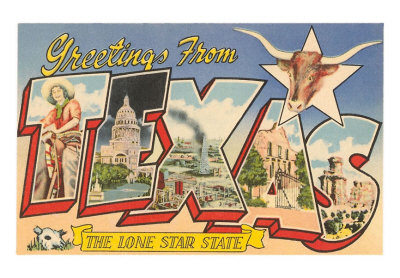
[Illustration by WMxdesign]
HUFFINGTON POST: The Bureau of Labor and Statistics found that Texas’ jobless rate has steadily crept up in recent months, not plunged to zero as Perry would have the nation believe. Unemployment was over 8 percent in June. New York, Virginia, Pennsylvania, Minnesota, Louisiana, Arkansas, and Wisconsin, and a slew of other states beat Texas on the employment numbers. And New York and several other states that outshined Texas did it without gutting environmental and labor regulations, slashing taxes, and with bare boned spending on education, housing, unemployment benefits and health  services, as in Texas. Even the 8 percent plus figure on Texas unemployment, though below the national jobless figure, is horribly misleading. In the state’s big cities, such as Houston, the jobless rate matches the national figure, and in rural, impoverished areas, the jobless rate soars to double digit figures. This means only one thing. More and more people in the state have sunk into or never risen out of poverty. The quality of life indices on Texas amply confirm that. And an increase in the number of poor people invariably translate out to more children in poverty, greater income disparities, a dearth in quality prenatal care, and higher teen birth rates. Texas ranks in the bottom ten in every one of these areas and is a rock bottom number 50 among the nation’s 50 states in the number who graduate from high school by age 25. MORE
services, as in Texas. Even the 8 percent plus figure on Texas unemployment, though below the national jobless figure, is horribly misleading. In the state’s big cities, such as Houston, the jobless rate matches the national figure, and in rural, impoverished areas, the jobless rate soars to double digit figures. This means only one thing. More and more people in the state have sunk into or never risen out of poverty. The quality of life indices on Texas amply confirm that. And an increase in the number of poor people invariably translate out to more children in poverty, greater income disparities, a dearth in quality prenatal care, and higher teen birth rates. Texas ranks in the bottom ten in every one of these areas and is a rock bottom number 50 among the nation’s 50 states in the number who graduate from high school by age 25. MORE
ASSOCIATED PRESS: The biennial study, “Texas on the Brink,” compared Texas to the rest of the country based on various functions of government, including public education and taxing, and other measures, such as air quality and health concerns. The report ranked Texas first among U.S. states in carbon dioxide emissions and for the amount of hazardous waste generated, second in the number of students enrolled in public schools and seventh in teenage birth rate. Texas ranked 33rd in the average salary of public school teachers, and 46th and 47th respectively for tax revenue raised per capita and tax expenditures per capita. The state ranked 49th in both average credit score and the percent of its low-income population covered by Medicaid. Texas was ranked last in the percent of pregnant women receiving prenatal care in their first trimester. MORE
CBS NEWS: But Perry also got lucky when high oil prices boosted energy-related jobs. His critics point to another figure: Texas’ high unemployment  rate at 8.2 percent is one point below the national rate that is daunting President Obama. Perry’s bedrock pledge to never raise taxes also had a reckoning this year, when his budget faced a $27-billion shortfall. With taxes not an option, Texas cut deeply into health care and so deeply into education, some 49,000 teachers are being laid off. “Do you see a Texas miracle?” Andrews asked Rachel Zertuche, a veteran middle school teacher. “No, I see a Texas tragedy.” MORE
rate at 8.2 percent is one point below the national rate that is daunting President Obama. Perry’s bedrock pledge to never raise taxes also had a reckoning this year, when his budget faced a $27-billion shortfall. With taxes not an option, Texas cut deeply into health care and so deeply into education, some 49,000 teachers are being laid off. “Do you see a Texas miracle?” Andrews asked Rachel Zertuche, a veteran middle school teacher. “No, I see a Texas tragedy.” MORE
NEW YORK TIMES: And if Mr. Perry were to win the Republican nomination, he would face critics, among them Democrats, who have long complained that the state’s economic health has come at a steep a price: a long-term hollowing out of the state’s prospects because of deep cuts to education spending, low rates of investment in research and development, and a disparity in the job market that confines many blacks and Hispanics to minimum-wage jobs without health insurance. “The Texas model can’t be the blueprint for the United States to successfully compete in the 21st-century economy, where you need a well-educated work force,” said Dick Lavine, senior fiscal analyst at the Center for Public Policy Priorities, an Austin-based liberal research group. MORE
PAUL KRUGMAN: What Texas shows is that a state offering cheap labor and, less important, weak regulation can attract jobs from other states. I believe that the appropriate response to this insight is “Well, duh.” The point is that arguing from this experience that depressing wages and dismantling regulation in America as a whole would create more jobs — which is, whatever Mr. Perry may say, what Perrynomics amounts to in practice — involves a fallacy of composition: every state can’t lure jobs away from every other state. In fact, at a national level lower wages would almost certainly lead to fewer jobs — because they would leave working Americans even less able to cope with the overhang of debt left behind by the housing bubble, an overhang that is at the heart of our economic problem. So when Mr. Perry presents himself as the candidate who knows how to create jobs, don’t believe him. His prescriptions for job creation would work about as well in practice as his prayer-based attempt to end Texas’s crippling drought. MORE
RELATED: It was the kind of scene that Texas Gov. Rick Perry will point to often as he rolls out his presidential campaign: a ribbon-cutting ceremony just outside Dallas, launching a corporate headquarters, with hundreds of new jobs, and validating what he calls his “Texas miracle” of growth. After a months-long courtship that included a trip to China, where he dined with the company’s chief executive, Perry announced that telecommunications firm Huawei Technologies would base its U.S. operations in Plano. In a video of that October 2010 event — now playing on YouTube, courtesy of the governor’s office — Perry praised the company’s “really strong worldwide reputation” and its chairman, Ren Zhengfei, whose straight talk he said reminded him fondly of West TexansWhile Perry focused on Huawei’s ability to create jobs in a sluggish economy, national security experts in both the George W. Bush and Obama administrations had concluded that the global telecom giant poses a potential cyber-security risk to the U.S. military and businesses. Three times since 2008, a U.S. government security panel has blocked Huawei from acquiring or partnering with U.S. companies because of concerns that secrets could be leaked to China’s government or military. MORE
PREVIOUSLY: AS IT WAS WRITTEN: Rick Perry & The False Prophets
RELATED: Is Rick Perry As Christian As He Thinks He Is?
RELATED: Of the three most plausible candidates for the Republican nomination, two are deeply associated with a theocratic strain of Christian fundamentalism known as Dominionism. If you want to understand Michele Bachmann and Rick Perry, understanding Dominionism isn’t optional. […] Put simply, Dominionism means that Christians have a God-given right to rule all earthly institutions. Originating among some of America’s most radical theocrats, it’s long had an influence on religious-right education and political organizing. […] Dominionism derives from a small fringe sect called Christian Reconstructionism, founded by a Calvinist theologian named R. J. Rushdoony in the 1960s. Christian Reconstructionism openly advocates replacing American law with the strictures of the Old Testament, replete with the death penalty for homosexuality, abortion, and even apostasy.[…]  Rushdoony pioneered the Christian homeschooling movement, as well as the revisionist history, ubiquitous on the religious right, that paints the U.S. as a Christian nation founded on biblical principles. He consistently defended Southern slavery and contrasted it with the greater evils of socialism: “The law here is humane and also unsentimental,” he wrote. “It recognizes that some people are by nature slaves and will always be so … Socialism, on the contrary, tries to give the slave all the advantages of his security together with the benefits of freedom, and in the process, destroys both the free and the enslaved.” MORE
Rushdoony pioneered the Christian homeschooling movement, as well as the revisionist history, ubiquitous on the religious right, that paints the U.S. as a Christian nation founded on biblical principles. He consistently defended Southern slavery and contrasted it with the greater evils of socialism: “The law here is humane and also unsentimental,” he wrote. “It recognizes that some people are by nature slaves and will always be so … Socialism, on the contrary, tries to give the slave all the advantages of his security together with the benefits of freedom, and in the process, destroys both the free and the enslaved.” MORE
